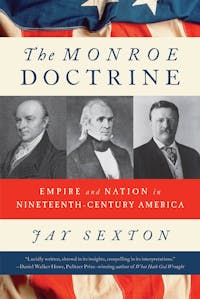The Monroe Doctrine
Empire and Nation in Nineteenth-Century America
 Download image
Download image
ISBN10: 0809069997
ISBN13: 9780809069996
Trade Paperback
304 Pages
$21.00
CA$28.00
A Choice Outstanding Academic Title
President James Monroe's 1823 message to Congress declaring opposition to European colonization in the Western Hemisphere became the cornerstone of nineteenth-century American statecraft. The Monroe Doctrine proclaimed anti-colonial principles, yet it rapidly became the myth and means for subsequent generations of politicians to pursue expansionist foreign policies. The crucial episodes in nineteenth—and early-twentieth-century foreign relations—westward expansion in the 1840s, Civil War diplomacy, the imperialism of 1898, entrance into World War I, and the establishment of the League of Nations—were framed by the Doctrine as its meaning evolved to suit the dreams and fears of an American empire. In Jay Sexton's adroit telling, The Monroe Doctrine provides a new lens through which to view a great paradox at the center of American history: the nation's conflicting tradition of anti-colonialism and imperialism.
Reviews
Praise for The Monroe Doctrine
"A first-rate, comparatively brief, and comprehensive introduction to a subject that is, at once, pertinent and fascinating. The Monroe Doctrine, and its application over time, teaches us a lot about the growth of the American republic. It also tells us something about American and European statecraft, the art of diplomacy, the extent to which mythology informs realpolitik, and right or wrong, the enduring value of our nation's founding principles."—Philip Terzian, The Weekly Standard
"Sexton supplies valuable context to . . . America's competing impulses of professed anti-colonialism and robust imperialism. Today, especially, The Monroe Doctrine—that sometimes illusory, always fascinating engine of diplomacy—should merit our attention."—Jonathan E. Lazarus, The Star-Ledger
"Explores competing and evolving conceptions of the doctrine from its origins in President James Monroe's 1823 address to Congress."—The Chronicle of Higher Education
"Lucidly written, shrewd in its insights, compelling in its interpretations, Jay Sexton's book shows the Monroe Doctrine being reinterpreted and variously applied by American statesmen across the decades from its inception to the time of Theodore Roosevelt and Woodrow Wilson."—Daniel Walker Howe, Pulitzer Prize-winning author of What Hath God Wrought: The Transformation of America, 1815–1848
"Jay Sexton reveals the sheer versatility of the Monroe Doctrine, its principles, and its application during the United States's nineteenth-century journey toward national consolidation and empire. His global perspective on national history delivers a subtle and powerful analysis of the interaction of American domestic politics and foreign policy within the shaping framework of British power. This is the Monroe Doctrine interpreted with unequalled complexity, originality, and clarity."—Richard Cawardine, president, Corpus Christi College, Oxford, and author of Lincoln: A Life of Purpose and Power
"In what is destined to become the standard account of the Monroe Doctrine, Jay Sexton does a marvelous job of bringing that much-misunderstood body of principles back to life in all its historical complexity."—Frank Ninkovich, author of Global Dawn: The Cultural Foundation of American Internationalism, 1865-1890
"Jay Sexton's The Monroe Doctrine is a provocative and original reinterpretation of the history of U.S. foreign policy in the long nineteenth century. Building on and moving beyond the best new work in international, British imperial, and American political history, Sexton illuminates the internal stresses and external challenges that transformed a weak federation of republics into a continental, hemispheric, and ultimately world power. Far more than the history of an iconic doctrine, this extraordinary book recasts the larger narrative of the new American nation's rise to power in exciting new ways."—Peter S. Onuf, author of Jefferson's Empire: The Language of American Nationhood
"A brisk, authoritative, essential history of the major pillar of American foreign policy. More often referenced than understood, the Monroe Doctrine served as the framework for debate over U.S. international relations for more than a century. Here, in a clear and confident analysis, Jay Sexton provides a vital account of its conception and evolution from John Quincy Adams through Theodore Roosevelt."—Eric Rauchway, author of Murdering McKinley
Reviews from Goodreads
BOOK EXCERPTS
Read an Excerpt
1
Independence
The American Revolution was the first of what would be many struggles for independence from colonial rule in the Western Hemisphere. This "age of revolutions," as it has been called, witnessed...



